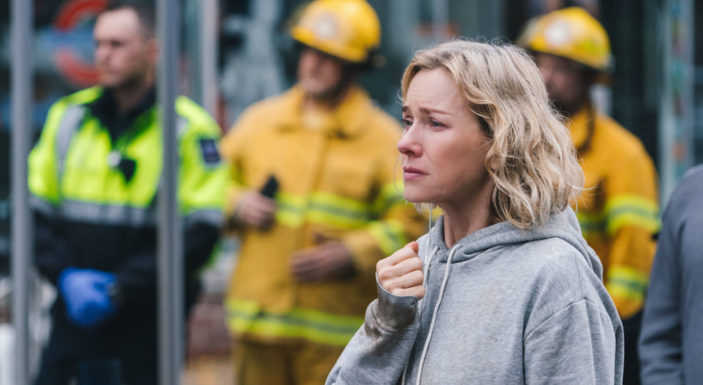
The core narrative of The Desperate Hour (previously screened as Lakewood at last year’s Toronto International Film Festival) is one that is ripe with tension and despair. It’s every parent’s worst nightmare come true. It’s a true shame then that Phillip Noyce‘s initially well-intentioned thriller devolves into absurdity, taking its serious subject matter and exploiting it in a practically offensive manner.
The subject matter on hand is that of gun violence in the education system, and it’s one that has been utilised throughout cinema history, but rarely has it been so mishandled as to what screenwriter Chris Sparling (Greenland) adheres to. Before the preposterousness takes shape, The Desperate Hour sets up an intriguing-enough concept with it laying focus on Amy Carr (Naomi Watts, the immensely capable actress in yet another filmic project unworthy of her dedication), a mother of two still struggling with the accidental death of her husband from the year prior. Her son, Noah (Colton Gobbo), has become distant and troubled, and their dynamic of how they are both coping with their loss feels like an additive that could earn genuine interest.
Imploring Noah to go to school, Amy takes off on a run in the remote woods area around her house after dropping her daughter off at the nearby bus stop, clearly needing to further collect her thoughts as the anniversary of her husband’s passing sets in. The intended tranquillity of Amy’s run is quickly interrupted by consistent phone calls, concerned rings that only trigger her anxiety more. Finally answering, Amy learns of a shooting attack at Noah’s school, sending her on a spiral as she calls 911 and fellow parents to uncover any information. She’s miles away from both the school and the community centre the authorities recommend parents gather at, leading her (and her iPhone) on a frantic journey.
At a lean 84 minutes The Desperate Hour at least never overstays its welcome, something we in return welcome as each subsequent phone call Amy makes along her travels becomes more and more outlandish to the point that she practically becomes an amateur detective, somehow savvy enough to even supersede law enforcement. Her desperation and fear is understandable, and Watts’ performance is never at fault as she completely commits to the material, and carrying an entire movie on your own would never be a simple feat; apart from bookended moments, the entire film is set around Watts as she runs and/or drives to her intended destination, communicating on her iPhone as the only other means of character interaction.
School massacres shouldn’t be used as a sort-of prop for a narrative, and the eventual foolishness of Amy being the one to vocally interact with the shooter further enhances The Desperate Hour‘s mishandling of events that are so utterly tragic and needless. To use them as a type of thrilling entertainment runs the risk of undoing their impact. Taking away that plot device, The Desperate Hour absolutely could have been a searing character drama about the acceptance of loss, the reality of grief, and the terror behind being unable to reach your child. Despite a suitably compelling turn from Watts, this is a film that wildly misses the point on violent commentary.
![]()
![]()
![]()
![]()
![]()
TWO STARS (OUT OF FIVE)
The Desperate Hour is screening in select theatres, digital and On Demand in the United States from February 25th, 2022. An Australian release is yet to be determined.
